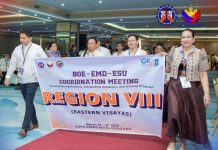MAKATI CITY- Nine local government units from the region have joined the roster of Municipal Leadership and Governance Program (MLGP) completers, overcoming the six building blocks of the country’s health system.
On Thursday (Sept.29) afternoon, the University of the Philippines (UP) Manila-School of Health Sciences in partnership with Zuellig Family Foundation (ZFF) and the Department of Health (DOH) held a colloquium at the Asian Institute of Management Conference Center in Makati City.
The colloquium is a final requirement to complete their MLGP. During the event, mayors shared how their personal and leadership transformations paved the way for much needed reforms in their local health systems to help their poor constituents.
MLGP graduates were former mayors Loreto Yu of Alangalang, Leyte; Alden Avestruz of Barugo, Leyte; Fe Renomeron of Burauen, Leyte; Manuel Sia-Que of Dulag, Leyte; Mayors Kathleen Prudenciado of Almagro, Samar; Gemma Zosa of Sta. Margarita, Samar; Marilou Latorre of Villareal, Samar; Mark Biong of Giporlos, Eastern Samar; and Mario Madera of Mondragon, Northern Samar.
The local leaders were accompanied by their respective municipal health officers who also graduated from the MLGP.
“It is our duty to implement health plans and programs, allocate the maximum resources available, and support health workers and staff to ensure the well-being of our constituents,” said Salvador Isidro Destura, dean of the UP-Manila-School of Health Sciences.
The health department emphasized the value of building the capacities of local government units considering that they are frontline service providers after the devolution of health programs.
“Our graduates this afternoon can now be truly called bridging leaders. We also look forward that through them, we will be able to sustain all health initiatives,” said Exuperia Sabalbarino, DOH-8 local health system development system section chief.
ZFF vice president Arlene Gelia noted that the program enables transformation of mayors and local health leaders.
“You have true commitment to improve health in your communities by greening your score cards,” she said.
Score cards are tools used by the program to measure the local government’s performance before and after joining the program.
Indicators with green colors show good performance while red signifies poor performance.
The program has training and leadership coaching on local health system development, with focus on the World Health Organization’s 6 building blocks of health system.
These are good governance in the health sector, health service delivery, health workforce, health information, access to essential medicines, and healthcare financing.
The benefits of the program include personal development in health leadership and governance, improvement of municipal health outcomes, translate health outcomes into political gains, academic units leading to a master’s degree, networking and partnerships (building social capital), opportunity for health program grants and infrastructure development, and opportunity for Seal of Health Governance recognition.
In Eastern Visayas, there are already 49 mayors who completed the program, according to DOH.
(SARWELL Q. MENIANO)



